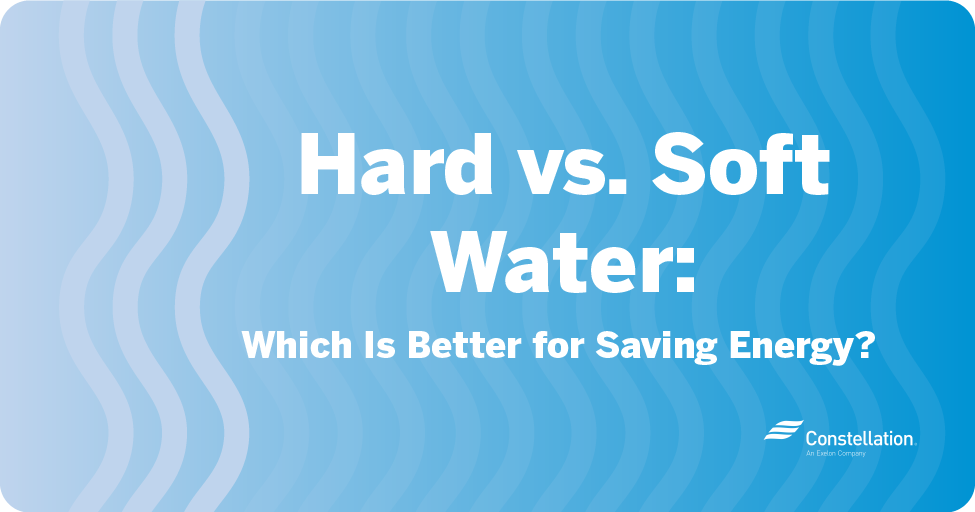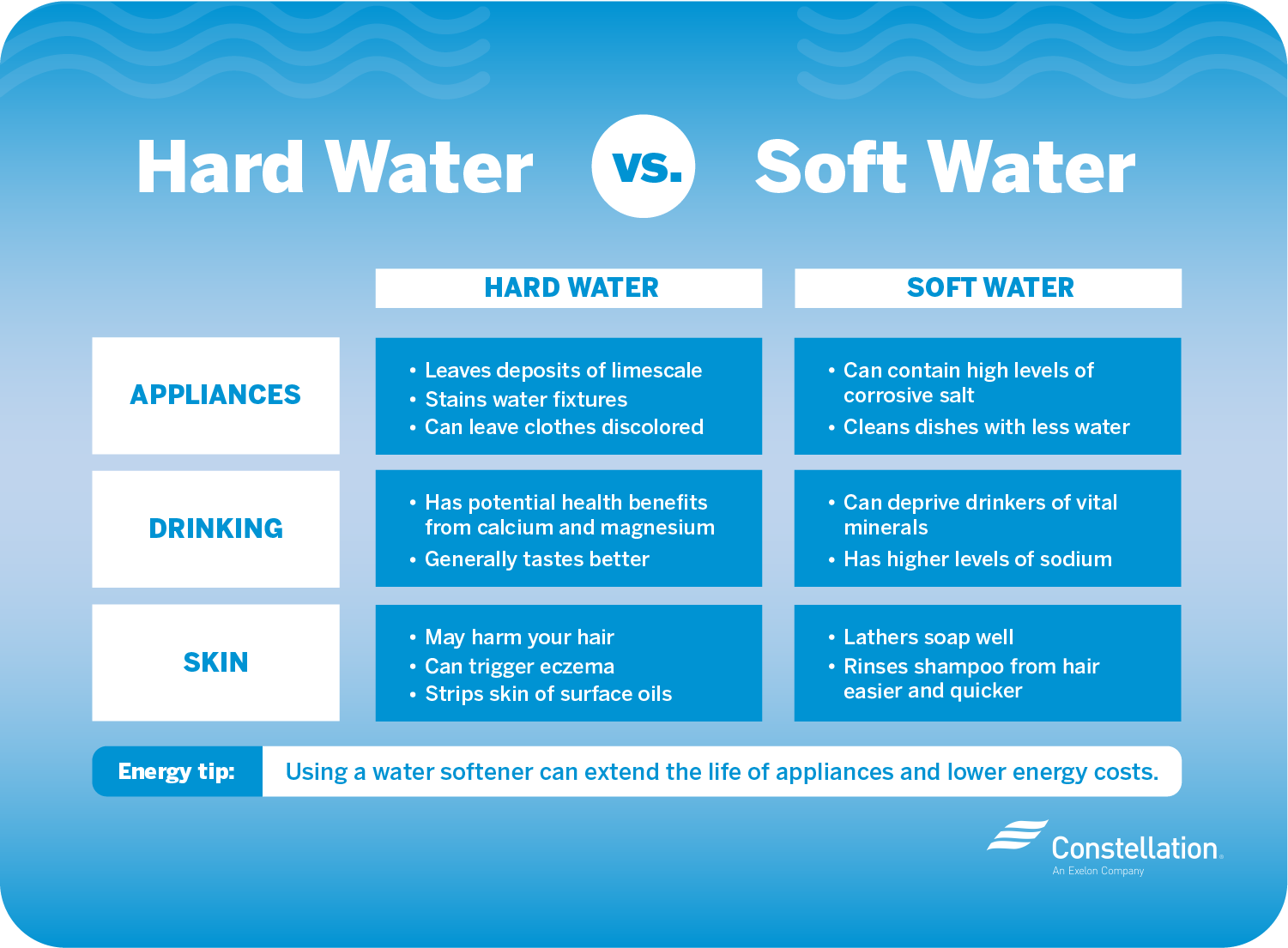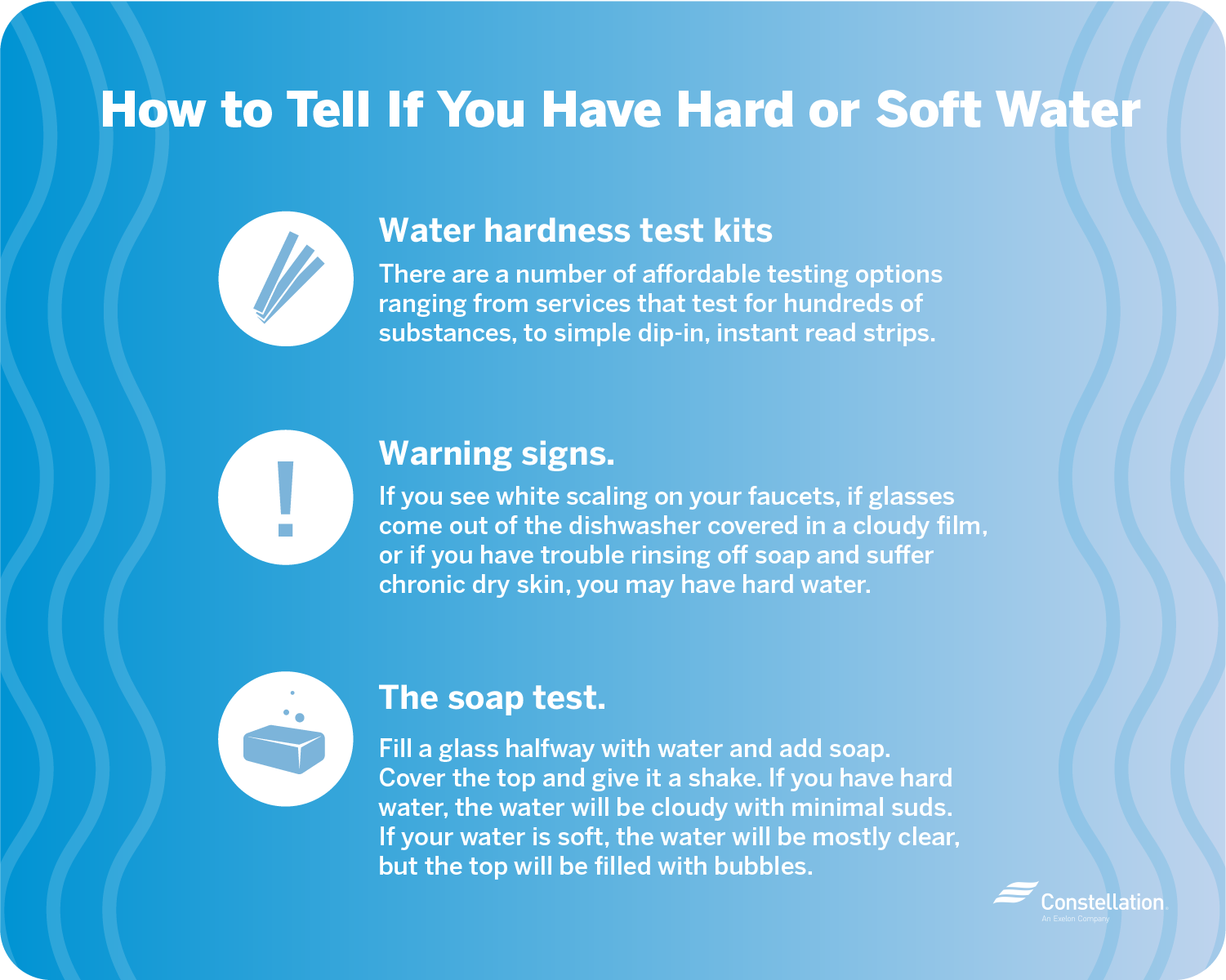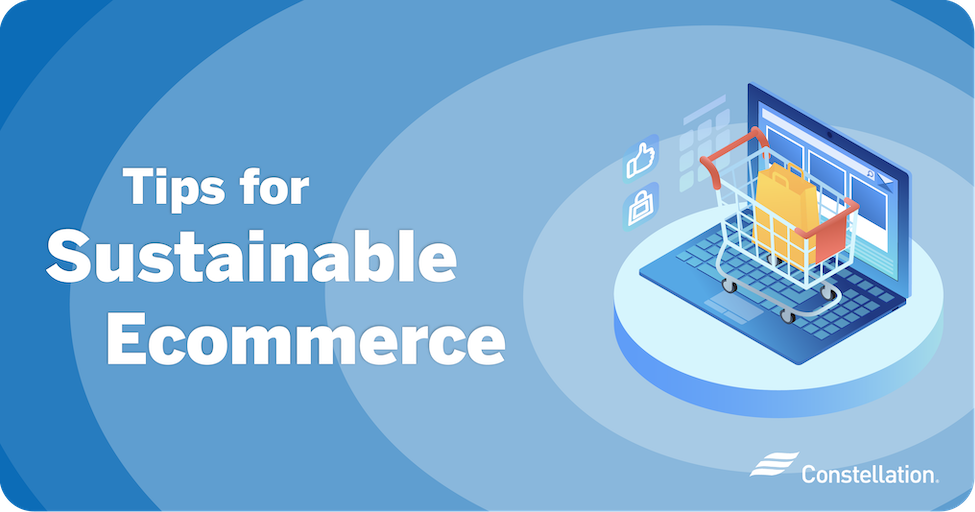
- Category:
Home Energy Savings -
Last updated:
July 28, 2022
Hard vs. Soft Water: Which Is Better for Saving Energy?
You turn on the faucet to wash your hands and fill up the tub to take a bath, but your water may be affecting more than just your hygiene. Water hardness, or the amount of dissolved calcium or magnesium in your water, could also be affecting your energy use. Hard water could even be responsible for making your appliances work harder.
For many, the hard water versus soft water debate boils down to costs. Mineral-saturated water costs include energy waste, wear and tear, inefficient operation, early failure of appliances and reduced lifespan of your plumbing. Increased use of chemicals needed to overcome the effects of hard water can also negatively impact the environment.
All in all, hard water can be a drain on your budget. On the other hand, hard water does have its benefits in terms of taste (sometimes) and health. Knowing the differences between hard water and soft water, and their trade-offs, can help you choose the best option for your home and potentially save your appliances.
What is the difference between hard and soft water?
The softness or hardness of your water can have a direct impact on your appliances and their energy usage. We talk in terms of hard and soft water, but the truth is that water chemistry runs along a spectrum from very soft to very hard, with variations in between.
Paying a little attention to the differences between hard and soft water can help you optimize for taste, health, your appliances and plumbing and for energy efficiency.
What is hard water?
Hard water contains a high concentration of dissolved minerals — usually calcium and magnesium, but sometimes also iron. But the answer to the question “what is hard water?” is a matter of mineral concentration.
A concentration greater than 60 milligrams per liter of water is considered “hard.” Extremely hard water can top 180 milligrams per liter. At these levels, you should expect to see mineral buildup affecting your appliances.
What is soft water?
Water with little or no calcium or magnesium content is considered soft water. Water can be naturally soft, like rain water, or it can be chemically softened to remove calcium and magnesium.
Hard water can be softened by being flushed through a salt solution that exchanges the calcium and magnesium ions for salt ions. The result is softened water that contains salt ions—though not enough to taste. Naturally soft rain water or distilled water may contain no minerals at all.

Hard vs. soft water: Which is better for your energy usage and home appliances?
When considering the impacts of hard and soft water, your energy use and impact on home appliances are major concerns. Hard water isn’t just hard on your budget, but it is hard on your appliances and your belongings.
Hard water can leave deposits of limescale inside your appliances and can stain fixtures with iron deposits. Dishes washed in hard water can come out with a cloudy film and water spots. Clothes laundered in hard water can come out discolored by a mineral film and can be stiff and scratchy. Your clothes may also fade more quickly and wear out faster from the micro-abrasives in hard water.
How hard and soft water affects energy usage
Hard water makes your appliances work harder to accomplish the same tasks. As mineral deposits build up in your water heater, it takes more energy to heat up the water for everyday tasks.
The same goes for your washing machine and dishwasher. As pipes accumulate mineral build-up, their flow capacity is reduced, and may cause motors to work harder to distribute water across your home.
Because soap does not work as well in hard water, you will have to use more soap and run longer wash and rinse cycles— further running up your energy meter. This can affect all your appliances, for even smaller appliances like your coffee maker or hot iron can be forced to work harder due to scale build up.
Can hard water ruin my appliances?
Hard water does more than make your appliances less energy efficient or create unsightly spots, stains and build-up. It can do serious harm to pipes, pumps, motors and nozzles.
The Department of Energy details how hard water can damage your appliances over time. Limescale can cause moving parts to burn out and cause important components to stop working due to build up.
Thinking about hard and soft water, softened water can become corrosive due to salt content, so chemically softened water isn’t necessarily always better than hard water. In the end, water quality can lead to expensive repairs and can dramatically shorten appliance life.
These appliance maintenance tips, frequently cleaning your appliances and keeping an eye out for issues, can head off problems early, before they become expensive or destructive.
Soft vs. hard water: Which is better for drinking?
Drinking hard water versus soft water is not a health hazard. In fact, the National Institutes of Health have found positive health benefits for drinking hard water, as calcium and magnesium play important roles in improved heart function, digestion, blood sugar regulation, even cancer fighting. Hard water can taste better, as well.
Research supported by the World Health Organization found soft water had negative impacts. Softened, demineralized water deprived people of vital minerals and heightened sodium consumption. Some experts say consumers should use both hard and soft water; soft water for appliances and bathing and hard water for drinking.
How your drinking water affects your energy usage
Compared to soft water, keeping hard water for drinking and other household uses will have a negative impact on your appliances and energy use. According the recent Water Quality Research Foundation study, appliances using soft water have a 30-50% longer life.
And they don’t have to work as hard, which can cut energy use by 27%. Running a water softener consumes about as much energy over the course of a year as an alarm clock.
Soft water vs. hard water: Which is better for your skin?
Hard water can be harmful to skin and hair. Soap does not lather as well in hard water, so you need to use more, which can be hard on your skin and hair. It is difficult to rinse shampoo from hair using hard water. The effect is to strip vital oils and leave a surface film that causes hair to be dull and prone to breaking.
Hard water leaches moisture from your skin, triggering eczema and other skin conditions. Minerals in the water make it harder to rinse off — hard water minerals can bind with soap to leave a sticky film on skin and hair that traps bacteria and reacts with skin.
How bathing in hard or soft water affects your energy usage
Longer showers, more soap and extra rinses all add up to using more water and more energy. Compared with the cost of running a water softening system, bathing in hard versus soft water can have a significant impact on your energy usage.
How can you tell if your water is hard or soft?
Testing your water to determine if it is hard or soft is an important step in managing energy use and your water’s impact in your home and life.

You can tell if you have hard water or soft water by the following:
- Water hardness test kits. There are a number of affordable testing options ranging from services that test for hundreds of substances, to simple dip-in, instant read strips.
- Warning signs. Knowing whether you have hard water versus soft water can be a matter of simple observation. If you see white scaling on your faucets, if glasses come out of the dishwasher covered in a cloudy film, or if you have trouble rinsing off soap and suffer chronic dry skin, you may have hard water.
- The soap test. This simple test won’t tell you the mineral concentration in your water, but it is a cheap and easy way to know if you have hard water. Fill a glass halfway with water and add soap. Cover the top and give it a shake. If you have hard water, the water will be cloudy with minimal suds. If your water is soft, the water will be mostly clear, but the top will be filled with bubbles.
Using water softeners to help with hard water
Typical water softener systems work by flushing hard water through resin beads containing positively charged sodium and potassium ions. The sodium and potassium are released into the water as the resin beads attract the calcium and magnesium ions, which are also positively charged. The result of this exchange is softened water containing small amounts of sodium and potassium.
Advantages of using a water softener
Advantages of using a water softener include:
- Cleaner dishes with no cloudy film.
- Softer clothes with less fading and wear.
- Use less soap and detergent.
- Tubs, sinks and toilets are shiny and clean.
- Softer skin with fewer skin problems.
- Use less hot water to rinse, saving energy.
- Clean, strong, shiny hair.
- Longer life for major appliances like water heaters, washing machines and dishwashers, as well as small appliances like irons and coffee makers.
- Lower maintenance costs.
- Lower energy bills.
Disadvantages of using a water softener
Disadvantages of using a water softener include:
- Cost of maintaining and running the water softener.
- Sodium in the water can be corrosive.
- Not suitable for drinking.
- May contribute to a variety of health problems.
Balancing the pros and cons of dealing with hard water versus soft water has wide-ranging impact. Hard water may have health benefits, but they come at a cost.
Higher energy use, inefficient appliances and shorter lifespans for these appliances can have a significant impact on your budget. Hard water also has negative effects on your clothes, dishes, skin and hair make water softening an attractive option.




